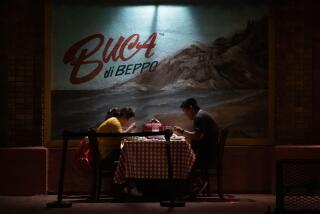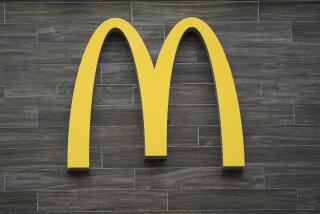A Pepsi Challenge
- Share via
PepsiCo Inc. said Thursday that it will spin off its $11-billion restaurant division as it refocuses its corporate firepower on a long-standing rivalry with beverage industry leader Coca-Cola Co.
The Purchase, N.Y.-based giant said it will turn over its Taco Bell, KFC and Pizza Hut chains to PepsiCo shareholders as a publicly traded company, most likely by year-end. Shareholders will receive stock in the new company based upon their current holdings in PepsiCo.
The announcement came after the market closed, but rumors of the deal sparked intense trading earlier Thursday. PepsiCo was the most-actively traded stock on the New York Stock Exchange. Its shares climbed $3.50 to close at $35.50, just below its record high of $35.875.
PepsiCo Chairman and Chief Executive Roger Enrico said the spinoff would “dramatically sharpen PepsiCo’s focus” as it battles with Coke worldwide.
“Our restaurant business has tremendous financial strength and a very bright future,” Enrico said. “However . . . we believe all our businesses can better flourish with two separate and distinct managements and corporate structures.”
Enrico’s move will delight disgruntled shareholders who have been demanding that the giant company shed the profitable but inconsistent restaurant division and concentrate on its core beverage and Frito-Lay snack operations.
“Right now, PepsiCo has to attack the world, to continue to open [countries such as] China,” said Tom Pirko, president of Bevmark LLC, a New York-based consulting firm. “It shouldn’t be worrying how to survive a bloody profit crunch in the pizza business.”
When measured by sales, PepsiCo’s 29,000 restaurants would form the world’s second-largest restaurant company behind McDonald’s. But the division has been struggling to generate steady profit. During the last year, for example, KFC performed well while profit at Pizza Hut and Irvine-based Taco Bell stalled.
With the spinoff, Enrico has agreed to concentrate on the $10.5-billion beverage line and the $13.2-billion snack business that have formed the core of PepsiCo since the 1930s. Analysts said the shift in focus should benefit shareholders.
“Coke is successful because of its phenomenal concentration on its core business,” Pirko said. “And Pepsi has got to be in the same mode. . . . It’s got to focus on its beverage and snack units.”
PepsiCo did not offer terms of the proposed spinoff. But Wall Street’s reaction before the announcement showed that investors are embracing the long-rumored spinoff.
The restaurant company could have a value of about $5.50 a share, or $8.54 billion, depending on the number of shares outstanding and how much debt Pepsi shifts to the restaurants, said Alec Patterson, an analyst at RCM Capital Management, which holds about 5.2 million PepsiCo shares.
*
For PepsiCo, the spinoff brings to an end a 25-year attempt to juggle two distinctly different businesses.
“Pepsi and Frito-Lay are very powerful trademarks that can be marketed as such,” said John Sicher, publisher of Greenwich, Conn.-based Beverage Digest. “But restaurants put PepsiCo into a retail business, and a lot of industry analysts have felt that the two businesses would both do better in separate companies.”
Pepsi executives have told bottlers that “they’re indeed making structural changes in the U.S. that will allow them to compete more effectively at the soda fountain business,” Sicher said.
“And on the international side, they’ve said that Pepsi is going to be a big player internationally by competing in markets where they’re already strong as well as in developing markets like Eastern Europe and the Far East.”
Taco Bell President and Chief Executive John Antioco said the newly created company should thrive because “we will be operated as a restaurant company by restaurant managers . . . and we’ll make our decisions based solely on what’s best for the restaurants.”
But industry analysts said there are no guarantees of success for the company that boasts $20 billion in sales from company-owned stores and franchise outlets.
“McDonald’s is competing with Taco Bell, KFC and Pizza Hut today and they’ll be competing with them tomorrow,” said Ron Paul, president of Technomic Inc., a Chicago-based consulting firm.
“PepsiCo has, in effect, said that restaurants were the weakest part of its business,” said Randall Hiatt, president of Fessell International, an Irvine-based restaurant industry consulting firm. “Now the restaurant chains are going to be standing there bare, in front of everyone, without PepsiCo’s support.”
PepsiCo’s worldwide restaurant division includes 4,800 Taco Bells, 5,000 company-operated KFC stores and 8,800 Pizza Hut stores. PepsiCo also has thousands of franchise locations as well as 8,000 restaurants overseas. The new company might also include a PepsiCo division that distributes $3 billion in equipment and supplies to Taco Bell, Pizza Hut and KFC.
(BEGIN TEXT OF INFOBOX / INFOGRAPHIC)
Sticking With Soda
PepsiCo’s spinning off its restaurant division, which includes Taco Bell, Pizza Hut and KFC, to concentrate on its core soft drink and snack businesses. Although the restaurant division is the strongest of the three in sales, it is a distant third in operating profit. The foreign market for soft drinks is growing rapidly, with Coca-Cola far in the lead. The announcement caused Pepsi’s stock to climb $3.50 to $35.50 a share Thursday. Pepsi and Coca-Cola shares were both near the $20 level in January 1994, but since then Coke has rocketed as Pepsi has lagged, in part because of the performance of its restaurants unit.
Sales
Percentage for each division of PepsiCo’s 1995 sales of $30.4 billion.
*--*
Percentage of overall company sales Restaurants 37% Beverages 35% Snack foods 28%
*--*
Operating profit
Percentage for each division of 1995 operating profit of $3.17 billion:
*--*
Snack foods 45% Beverages 41% Restaurants 14%
*--*
Market share
Global soft-drink market share in 1995: *--*
Company 1995 Market share Coca-Cola 47.2 PepsiCo 22.1 Cadbury Schweppes* 7.9 Other 22.8
*--*
*Includes Dr Pepper and Seven-Up
The stocks: Monthly closes and latest for PepsiCo and Coca-Cola.
Largest U.S. Chain Restaurants
PepsiCo Inc. is the second-largest U.S. chain restaurant owner in an industry that racked up a whopping $99.7 billion in sales in 1995. A look at 1995 market share for the five largest chain restaurants in the U.S.:
*--*
Rank Restaurant 1995 U.S. market share 1 McDonald’s Corp. 15.9% 2 PepsiCo Inc.* 13.8% 3 Grand Metropolitan (Burger King, Haagen-Dazs) 6.9% 4. Wendy’s International Inc. (Wendy’s, Tim Hortons) 4.0% 5 Imasco Ltd. (includes Hardee’s, Roy Rogers) 3.5%
*--*
* Includes Pizza Hut, Taco Bell, KFC, California Pizza Kitchen, Chevy’s Mexican Restaurants, D’Angelo Sandwich Shops, East Side Mario’s, Hot ‘n Now Sources: Company reports, Technomic Researched by JENNIFER OLDHAM / Los Angeles Times
*
* WALK TO THE BORDER
Taco Bell’s poor performance is one reason Pepsi is losing food units. D6
More to Read
Inside the business of entertainment
The Wide Shot brings you news, analysis and insights on everything from streaming wars to production — and what it all means for the future.
You may occasionally receive promotional content from the Los Angeles Times.










